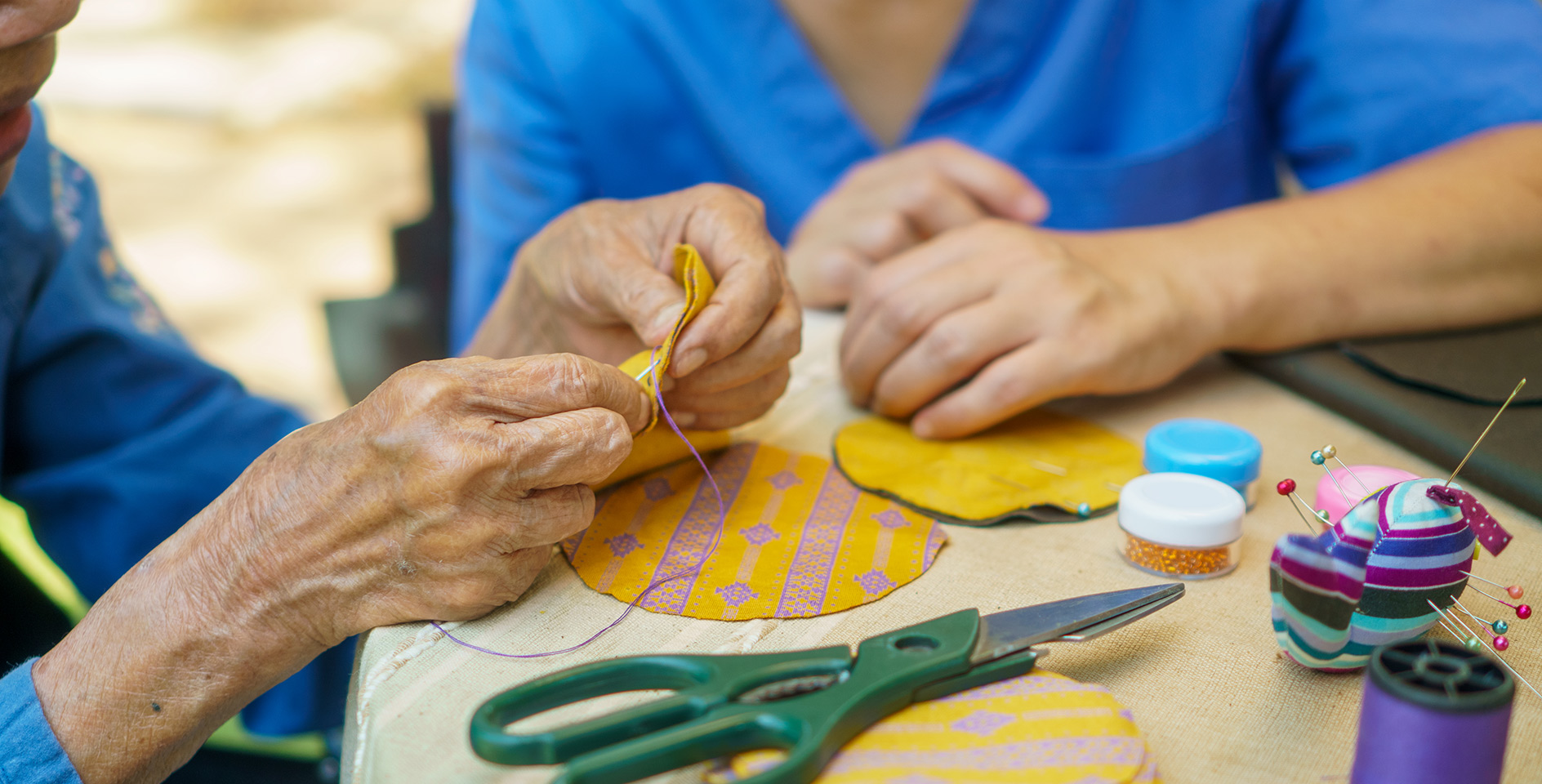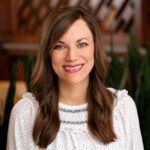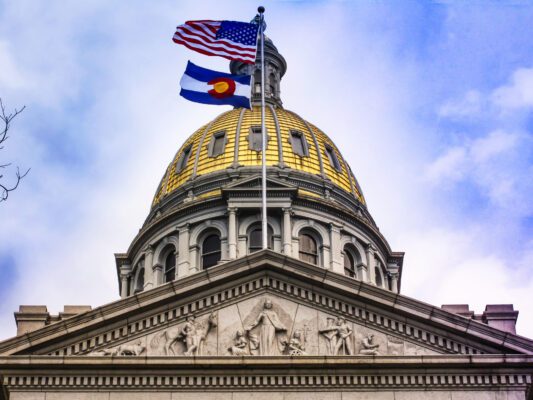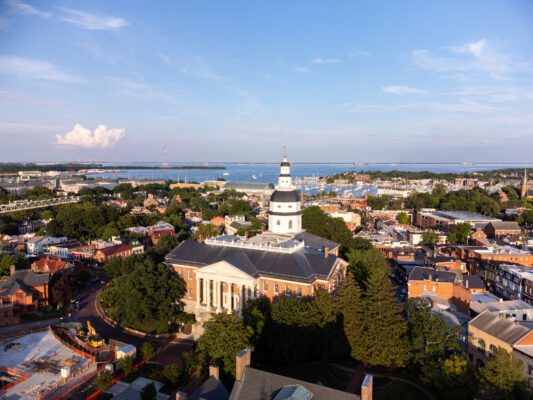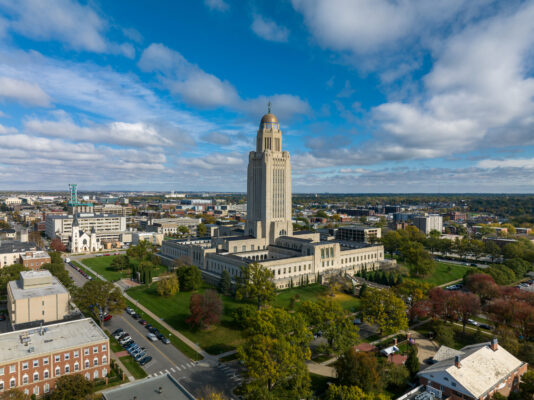November is National Alzheimer’s Awareness Month. At a past ERLC National Conference on family, we covered a variety of topics helpful to living in a way that honors Christ. One of the breakouts we hosted was titled “Finishing Well Panel: Grandparents, Widows and Caring for Family in their Final Days.” These are important topics that have a lot to do with what we communicate about the gospel, what we communicate about the Lord, and what we communicate about the dignity of everyone in every stage of life. I was joined by several panelists, including:
Debbie Bethancourt: a mother, grandmother, and caretaker.
Susie Hawkins: a pastor’s wife and ministry leader.
Benjamin Mast: a professor of Psychological and Brain Sciences at the University of Louisville.
Daniel Darling: an author, senior vice president of National Religious Broadcasters, and a pastor.
Lindsay Nicolet: I want to start out talking about grandparenting and grandparents. Debbie and Susie, grandparenting is so important, though it might not be elevated in our society. What unique impact can a grandparent have in their grandchildren’s lives? Why is it important as we talk about the cross-shaped family?
Debbie Bethancourt: We have 14 grandchildren and a lot of my friends say, “Well, I only have four.” And I’m say, “Well, you know, it’s not a race. You get what you’re given.” So we have a lot of love to give, and we’re happy with the 14 that we have. I’m very blessed with them. When we had our first grandchild, we had triplets. So we got started off with a bang. And my first thought when I was holding little Luke in my hands and trying to get him to eat at 2.5 pounds was, How in the world are these parents ever going to be able to teach them everything they know? But you know what? They’re 15 now, and those parents have done a great job; not always like I would have done it, but I’ll be first to tell you that I’ve learned over my lifetime that there’s more than one way to do something right. And for me, I just feel like my job was to support, pray, encourage, be a good example, and to just be available for those parents.
Susie Hawkins: That’s exactly right, Debbie. I would add that I see grandparenting as a safety net. In God’s design of the family, extended family and grandparents are a safety net for parents that may be sick or incapacitated in some way. And so you’re a safety net not only just for the physical care sometimes of grandchildren, but the spiritual care as well, because you do have a little more time to pray for them, to concentrate on who they are and their interests, and to invest in them personally in some ways that parents don’t always have.
The other thing I would say about that is that grandparenting gives you a certain distance to help when your daughter or son calls you and says, “We’re having some struggles here, you know, what about this? What about that?” Oftentimes you will find your adult children have a little more of renewed interest in how you parented them, especially as it relates to how they may need to parent their children. So, I think in this day and age grandparenting is more important than ever. Invest in the children and your grandchildren as much as possible.
LN: Dr. Mast, I want to transition to talking about widows. You can’t read the Bible without realizing God’s heart for the vulnerable and being a defender of the fatherless and taking care of widows; in James, it’s true and pure religion before the Lord. Why do you think this is a key theme in the Bible? And what can Christians learn from it?
Benjamin Mast: We’re in this particular culture where we are striving for power everywhere we turn, and we hold up those who have power and those who have influence. When we look at widows, one characteristic that we can see is that they are among a category who are particularly vulnerable. Not necessarily all widows are dependent upon us, but they’re vulnerable emotionally, spiritually, financially. And it’s just as if God has a special place for the vulnerable in his care. He’s teaching us something about where we can be directing our attention and our ministry—it isn’t always about the powerful and the showy and what’s out front. This is a sort of a behind-the-scenes ministry where we’re reaching out to those who might need special care, help, and even protection.
The other thing I think about with orphans and widows is they’re both defined by either the loss or the absence of a relationship, whether parents or a spouse. And God repeats over and over in the Old and New Testament that he will be with us, that he’s present with us, and he doesn’t want us to be alone. So I think part of the reason why it’s so important and what we can learn from it as Christians is that we can be a manifestation of God’s presence and care for those people in that particular stage of life. It forces us to slow down, to look behind the scenes, and maybe look for more of what’s going on.
LN: I think sometimes it’s out of sight, out of mind. We are around less elderly people because we are less multigenerational as a society and as a civilization. Dan, what other factors do you think lead to this lack of a multigenerational society, even in the church and family? And what do we lose in this?
Dan Darling: I do think one of the things that lends to sort of neglect of widows or even the elderly in our congregations is sometimes in the church there’s a subtle message that we only want church for young and active. We have to be careful because sometimes we actually market that this church is only for the young and the good looking. In fact, there’s a sad story from our community I wrote about in one of my books. There was a guy that was playing guitar at a big church near us for years on their worship team, and all of a sudden they took him off the team. The reason was that he had gray hair. And I just think that’s so antithetical to the kingdom of God.
You are valued in the kingdom of God, but not because of what you can bring to the body. I think of a gentleman in our church right now who has really late-stage dementia and he can’t even remember his wife’s name. But he comes to church every week and he worships. He actually remembers the worship songs, which is amazing. And he can’t give us great leadership or giftings or even resources. But we need to communicate that he is as valuable to our body and is as important to us because he’s fully human, and God sees him as valuable as anybody else.
Regardless of where you are in terms of your life [stage and quality], you are still a full part of the body of Christ and will one day be resurrected into newness and fullness of life.
LN: Living in multigenerational community is not without its hardships. Debbie, you mentioned it requires a lot of sacrifice because elderly parents get sick or we have siblings that get sick. What have you learned in your caregiving, and how could you encourage others here?
DB: Well, there are a lot of books written about aging, but there’s no particular book written about the process that you will go through with your aging parents. For our situation, I [had] a 93-year-old dad who did pretty well. And then I [had] an 87-year-old mom who was bedridden, being taken care of by hospice. And then on top of that, I have a 60-year-old brother who, when he was 35, was thrown from a car in a wreck and had a traumatic brain injury. He did pretty good taking care of himself until the last couple of years but is in a nursing home now.
So, I’ve learned that you need a lot of patience. The roles have reversed; you’re now in charge of telling your parents what to do rather than them telling you what to do. You’re always the bad guy. There’s a lot of confusion that goes on. You’re confused because you’re trying to learn everything. They’re confused because they’re in a new place. And every single day is a new day.
The second thing I’ve learned is to take care of yourself. If you get sick because you sat by their bedside day and night eating improperly, there’s no way that you can care for them. I’ve had friends that spent night and day with their parents, and they just are exhausted. When my brother was in the hospital, my dad said that the doctor told them to go home every night and have a good night’s sleep because they could not help their son if they were not fresh and ready to go in the morning. So thankfully, they remember that and have enabled me to be able to do that, too.
Another thing I’ve learned is I have to be a peacemaker. I have two brothers, and I am so blessed on this account because I haven’t really had to be a peacemaker. My brothers are happy to let me make the decisions. Then you find that you’re the mediator. You’re the mediator between doctors and caregivers. And, you have to keep everybody in check. But most of all, you have to be really nice to them because they’re in charge of your parents.
And finally, I’ve learned I’m not in charge. And I have great faith that the Lord is in charge, and he knows what he’s doing. I just sit back and wonder what he has planned because I saw my mom laying in a bed wasting away, and I saw my dad sitting by her bed holding her hand. And my main goal out of all this is just to try to be an example for my children and my grandchildren.
DD: I think the other side of it is that we have Christ as our ultimate caregiving model. So everything we’ve said is we’re giving up something of ourselves, sacrificing something of ourselves to love and care for someone else. And it’s always struck me that when Jesus is about to depart this world, one of the last things that he does is wash his disciples’ feet, which had to be a smelly, unpleasant task and one that they thought he shouldn’t be doing because he was too great. But then he teaches us to do likewise and tells us we’re blessed. So I think in caregiving we see this Christlike, sacrificial love that we’ve been called to. But what I often encourage is that you are a caregiver, not a savior. You have your limits.
One of the things that really surprised me when I began pastoring was that there were times where I would have an elderly parent in my church, and it was really hard for me to get the children to come and even be present and give care. And it really struck me and upset me and made me think deeply about our responsibility to care for those who are elderly. You see this cycle in the life of Jesus: he is first a dependent, vulnerable newborn who is being cared for by his mother. And then he sort of pushes away at the age of 12 and is independent. But then at the end of his life as he’s on the cross, he’s bleeding and dying for our sins, and he makes sure that his mother is cared for and assigns this to John. I think that’s such a powerful example for us in the church that this is not really an optional thing— this is something that God has called us to do.
LN: Dr. Mast, we see and hear more about Alzheimer’s and dementia these days. Will you clear up some of the misunderstandings that we might have? And will you tell us, as Christians, how we might be set apart in how we minister to those with Alzheimer’s or dementia?
BM: This is an area that I care quite a bit about. There’s just a real contrast in the way that we can think about and have hope for people who are dealing with Alzheimer’s and dementia. It’s a neurological disorder that affects the brain. It’s irreversible. It’s progressive. And our treatments aren’t that good. The way the world thinks about this is a person gets this disease, they can expect decay, disability, and death. And frankly, in our culture, when somebody no longer can contribute, when they can no longer remember, when they’re now becoming confused, they sort of cease to be a person slowly. And, in terms of hope, there isn’t much.
But I think, it’s important for us to remember what God has told us about what it means to be a person and who we are. And so, sure, that’s a person who’s affected by Alzheimer’s disease. Their brain is slowly being ravaged by these microscopic changes. But that’s still a person that was created in the image of God. That’s an image-bearer who deserves our honor and respect. We continue to talk to a person. We continue to try to engage them. We continue to try to minister to them. So even though we see these changes, we’re image-bearers. We’re children of God. We mattered enough that Jesus Christ would die for us and promises that he is going to make us new one day.
So what difference does it make that we’re image-bearers and children of God? I think it makes a huge difference in terms of our hope and the way that we approach someone. A passage that we use often in pro-life circles is Psalm 139, and it starts out by talking about how God searches us and knows us, knows the depths of us, and even before we speak he knows our needs and what’s on our heart. Romans 8 talks about how the Spirit searches us and intercedes in prayers on our behalf. Revelation tells us that one day he’s going to make all things new.
We think about all these things, and it isn’t just theoretical then. This is a person who matters, so when they can no longer contribute to our churches, they’re still a part of our body. We can still reach out to them. We can engage them with music, with prayer, with familiar Bible passages. And sometimes we even seek to minister to them not knowing whether we’re reaching them, and we trust the work of the Holy Spirit. I think a big part of it is that we continue to show up, to be present, and to see that person as somebody who has value and dignity. In our culture these days, dignity and value come with productivity and responsible behavior. And what we can do for the world is to show that when we approach people in grace, we bestow on them dignity, recognizing who God created them to be, even when their behavior maybe isn’t as appropriate as it used to be.
In talking with families, I ask them, “What’s the best thing that the church could do for you?” And the number one answer over and over is, “I just wish that somebody from the church were present on this journey with us and willing to go the long haul.” Here’s a story about a simple thing that you can do: a colleague told me about a family whose father got Alzheimer’s disease, and the church didn’t know what to do. So they just kind of kept their distance.
And the same man, two years later, was diagnosed with cancer and everybody immediately showed up with casseroles because there was a way for ministering to that family. And that’s still available to us in Alzheimer’s disease. We have to be the church. And as it’s harder for people to make it to the church service, which is definitely an issue in Alzheimer’s and other dementias, we need to be the church that goes to them. The head can’t say to the feet, “I don’t need you.” We need to be unified and have diversity not only of our age, but also in terms of our ability and our cognition.
LN: Dan, Dr. Mast mentioned pro-life terminology. When we think about being pro-life, we often think about babies. But, how is caring for the elderly, caring for the sick and the unable, a part of a whole life pro-life ethic? And what kind of opportunities does that open up to us?
DD: It definitely demonstrates how we feel about human dignity and about the fact that every human being is creating the image of God. But when we neglect the elderly, we’re actually going against what we say we believe because we’re saying that people are only valuable to us as long as there’s something that they provide for us. In our churches, almost all of us would disagree strongly, thankfully, with the “death with dignity” movement that says we should just end the lives of people who are in that state. But sometimes, by our neglect of people in that stage of life, we’re almost agreeing with that philosophy and saying that they are not useful to us. So, I think we just need to combat that with our care and by going to them and treating them as people, as valuable members of our body. For those of us who are young, one day we’ll be in that condition and we’ll want someone to care for us as well. Regardless of where you are in terms of your life [stage and quality], you are still a full part of the body of Christ and will one day be resurrected into newness and fullness of life.
LN: Dan, will you, once more, give encouragement as to why these issues are so important in helping us be the body of Christ and put on display how great our God is?
DD: One of the things that [these issues] teach us is the fragility of life. I think some of the reasons we don’t often want to be around people in the elderly stage of life is because it reminds us of our own frailty and weakness. And we don’t want to think about that. But it’s really the life cycle. And we learn to depend on Christ in our weakness. I also think it’s a picture of the kingdom of God, which is made up of the weak and the less than noble. This is what should make our churches otherworldly—that [everyone is] valued here because [they’re] valued by God.



